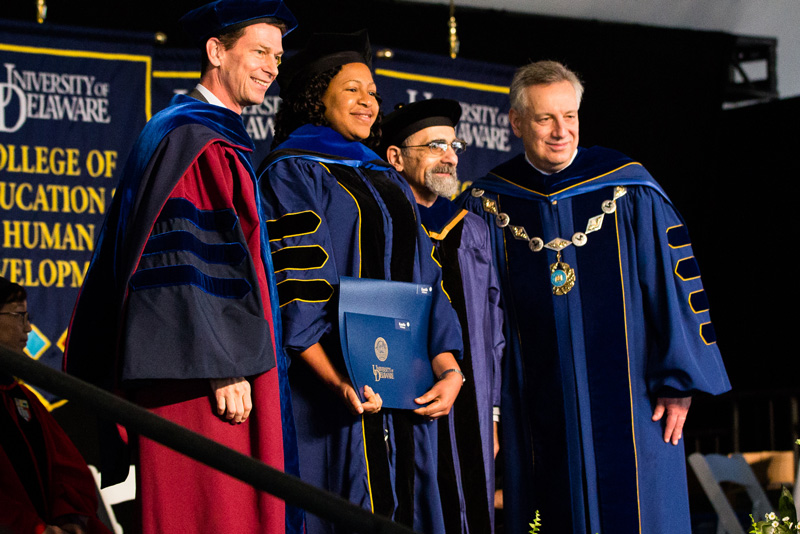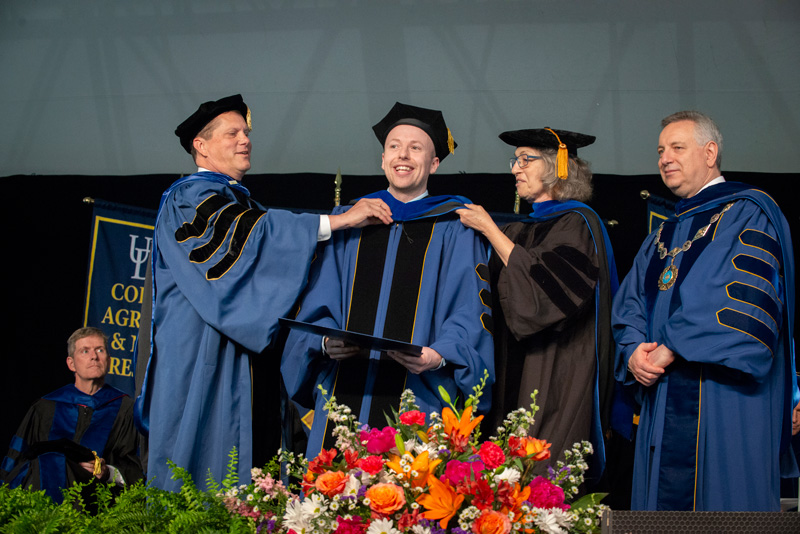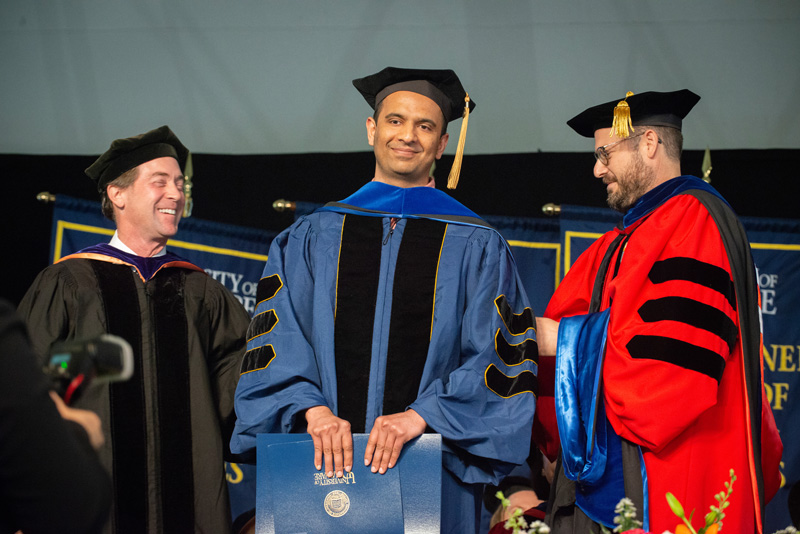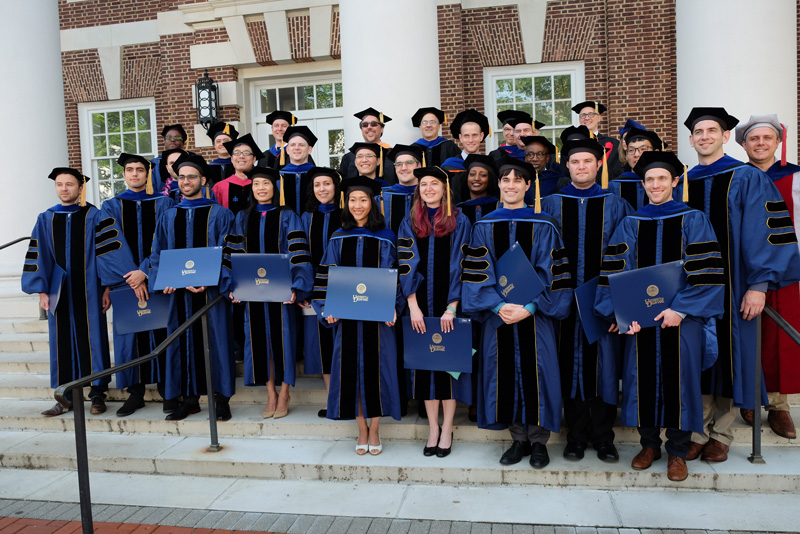

Five receive dissertation prizes at UD
Photo by David Barczak, Wenbo Fan and Jessica Eastburn May 25, 2018
From Fraktur to bioinformatics research, student scholars shine
Five graduating doctoral students received prizes at the University of Delaware’s doctoral hooding ceremony, held Friday, May 25, for their dissertations. The culmination of long hours of research, meticulous documentation and analysis, these scholarly works present students’ original findings to a field of study, and to the world.
Honorees and their awards are Alexander Ames, Wilbur Owen Sypherd Prize in Humanities; Kamilah Williams, George Herbert Ryden Prize in Social Sciences; Axel Moore, Allan P. Colburn Prize in Engineering and Mathematical Sciences; Christopher Long, Theodore Wolf Prize in Physical and Life Sciences; and Felix Francis, Interdisciplinary Research Prize. Descriptions of their work are featured below.
Wilbur Owen Sypherd Prize in Humanities
Alexander Ames won the Wilbur Owen Sypherd Prize in Humanities for his dissertation, The Letter and the Spirit: Calligraphy, Manuscripts, and Popular Piety in German Pennsylvania, 1750–1850. In it, Ames proposes a new approach to analyzing Pennsylvania German manuscript culture through the study of Fraktur, a German calligraphic style popular among German Pietists who made their home in the British colonies.
While scholarly tradition treated these manuscripts and objects as works of art, Ames uses them as a lens through which to understand the lived experiences, faith and culture of Pennsylvania Pietists, illuminating the significance of German Pietism to American religion. This influential movement, originating in the 17th century Lutheran church, emphasized personal devoutness over religious formality.
In his nomination letter, James Brophy, Francis H. Squire Professor of History at UD, described Ames’ dissertation as “trailblazing,” offering “new sight lines for interpreting transatlantic religious bonds.”
“For the first time, one sees illuminated hymns, musical notation, writing primers, and biblical quotations as part of an integrated, holistic pedagogy to enhance spiritual devotion through scribal practice … unlocking broader truths about Pietist sensibility through exacting analysis of local religiosity,” Brophy said.
Arwen Mohun, chair of the Department of History, called Ames “a formidable scholar in the humanities — a historian of American religion, a singular voice in the history of the book, and an authority on early American material culture.” At the same time, she said she considered Ames a “visionary citizen of UD,” too, citing his involvement on the American civilization doctoral degree program’s steering committee, conference presentations and even his musical talents playing the harp.
George Herbert Ryden Prize in Social Sciences
Kamilah Williams won the George Herbert Ryden Prize in Social Sciences for her dissertation, Does Information Sharing Matter? Cross-Country Evidence on Foreign Banks.
Williams analyzed data from over 90 countries and found that when higher level foreign banks were present, fewer domestic firms or individuals had access to loans, and when they did have access, these firms or individuals often encountered unfavorable interest rates, higher collateral requirements and lower overall access to credit.
And while having credit reporting systems increased the probability of consumers securing a loan, her dissertation showed this positive effect declined as foreign bank presence increased.
“Kamilah’s results are an important confirmation that financial globalization has not led to expanded access to bank loans for small borrowers in many economies,” wrote Stacie Beck, associate professor of economics and co-chair of Williams’ dissertation committee.
“Much research has found that access to credit is crucial for economic growth, so Kamilah’s research contributes to understanding potential impediments to growth, especially for emerging economies,” said Prof. James L. Butkiewicz, former department chair in economics.
Prof. Evangelos Falaris, co-chair of Williams’ dissertation committee, said he was impressed by Williams’ conclusion that “information-sharing mechanisms permit foreign banks to ‘skim the cream,’ in other words, to identify and lend to the most creditworthy borrowers leaving other borrowers with only access to costlier informal lenders.”
“This is a policy-relevant finding that may be useful to policymakers who could use it to design better ways to promote access to credit by more individuals and small firms,” Falaris wrote.
Allan P. Colburn Prize in Engineering and Mathematical Sciences
Axel Moore received the Allan P. Colburn Prize in engineering and mathematical sciences for his dissertation, Independent and Competing Roles of Fluid Exudation and Rehydration in Cartilage Mechanics and Tribology.
Moore’s research focused on the mechanics of human joint lubrication and its relationship to osteoarthritis, a condition affecting more than 45 million Americans. In particular, his groundbreaking discovery of tribological rehydration — the idea that movement acts to feed and hydrate the connective tissue, or cartilage, within our joints — enabling them to function better and longer is a quantum leap in understanding the relationship between inactivity and joint disease.
“Most importantly, his results suggest that intermittent joint movement is the pump that restores and maintains tissue hydration … in other words, cartilage slowly deflates during standing and inflates during walking and other activities,” wrote David Burris, associate professor of mechanical engineering and Moore’s adviser.
It is work that may someday inspire a new generation of biomaterials for joint replacement and other applications, according to Jason Gleghorn, assistant professor of biomedical engineering.
“The test of time and additional experimental and computational analysis will bear out if tribological rehydration is responsible for how cartilage ‘works’ and if it’s failure is responsible for the progression of osteoarthritis; however, Axel’s new ideas about a problem that has baffled people for more than half a century speak to his critical thinking and innovation in the lab,” Gleghorn wrote.
Dawn Elliott, Blue and Gold Distinguished Professor and chair of biomedical engineering, called Moore an “enthusiastic and valuable collaborator” whose seminal research prompted joint projects between multiple research groups across campus and led to two large federal grant submissions to study post-traumatic joint disease and explore potential physical treatments.
One of those collaborators, BME Assistant Prof. Christopher Price said he has “no doubt” that Moore’s thesis will “stand as a major discovery in the field of articular cartilage mechanics and joint health.”
Moore is only the second graduate student to complete UD’s biomedical engineering doctoral program.
Theodore Wolf Prize in Physical and Life Sciences
Christopher Long won the Theodore Wolf Prize in Physical and Life Sciences for his dissertation, Interrogating Bacterial Metabolism via the Mapping of Fluxomic Responses to Gene Knockouts and Adaptive Evolution.
Long studied the ways that strains of E. coli bacteria adapted and recovered in laboratory tests when the researchers “knocked out” the bacteria’s ability to use enzymes critical to metabolizing sugar for energy.
Maciek Antoniewicz, Long’s adviser and Centennial Professor of Chemical and Biomolecular Engineering, said Long is “one of the world’s experts in the field” of 13C metabolic flux analysis, an important tool in metabolic engineering that enables scientists to measure the cellular variations in a microorganism’s central metabolism.
Long describes several new methods for the in-depth analysis of the normal functions that take place in a cell, and his study reveals previously unknown bottlenecks and areas of flexibility in an organism’s metabolism. His results constitute a significant new resource for the biological community, particularly in systems metabolic engineering, that can be directly applied to develop new models and strains [of bacteria] to engineer desired products.
In a letter of endorsement, Eric Furst, professor and chair of chemical and biomolecular engineering, wrote: “His description of the metabolism of [the marine bacterium] Vibrio natriegens will help engineers harness these fast-growing species for next generation bioprocessing, including pharmaceuticals such as antibiotics, nutrients, renewable fuels and other specialty bio-derived chemicals.”
Long also was praised as a “wonderful teaching assistant” who devoted time to helping undergraduate students, others in the laboratory and colleagues throughout the broader discipline.
Interdisciplinary Research Prize
Felix Francis was awarded the Interdisciplinary Research Prize for his dissertation, Characterization of Genomic Diversity at a Quantitative Disease Resistance Locus in Maize using Improved Bioinformatic Tools for Targeted Resequencing.
His dissertation shines a light on the specific genes associated with disease resistance in corn (maize), a staple crop in agriculture, but it is the tools he developed to reproduce accurate DNA sequence data for specific segments of large and complex genomes that will have a long-lasting impact on his field. These tools include novel bioinformatics and statistical methods that advance plant genomic data analysis and will enable genomics researchers and practitioners to address important biological questions related to human health, agricultural breeding, infectious disease management, biodiversity conservation and more.
J. Antoni Rafalski, a biotechnology consultant and former senior research assistant at DuPont, called Francis’ work “an excellent example of interdisciplinary research” that will be “an example to follow for future students of biology, which is increasingly becoming intertwined with advanced computer science.”
Cathy H. Wu, Unidel Edward G. Jefferson Chair in Engineering and Computer Science and founding director of UD’s new Data Science Institute, agreed.
“The bioinformatics algorithms, software tools and benchmarking data sets he has developed will have broad impact to the genomic scientific community, allowing researchers to address many important biological questions,” Wu wrote.
According to his adviser and dissertation chair, Randall J. Wisser, the bioinformatics algorithms and software Francis developed to precisely isolate targeted DNA already are having an impact on researchers and practitioners across the country.
“This tool is useful for a range of applications in genetics and genomics, and a number of researchers outside of UD (across the U.S.) have already begun adopting it,” wrote Wisser, an associate professor in plant and soil sciences.
Contact Us
Have a UDaily story idea?
Contact us at ocm@udel.edu
Members of the press
Contact us at 302-831-NEWS or visit the Media Relations website





